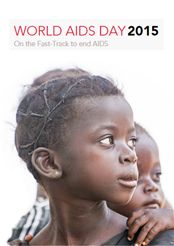Documents
World AIDS Day 2015
30 November 2015
The world has committed to end the AIDS epidemic by 2030 as part of the Sustainable Development Goals. This ambitious yet wholly attainable objective represents an unparalleled opportunity to change the course of history for ever—something our generation must do for the generations to come.
Today, we live in fragile communities where inequities can persist when essential services don’t reach the people in need. To change this dynamic we must quicken the pace of action. We know that strengthening local services to reach key populations will lead to healthier and more resilient societies.
The good news is that we now have what it takes to break this epidemic and keep it from rebounding—to prevent substantially more new HIV infections and AIDS-related deaths and to eliminate HIV-related stigma and discrimination.
Already we have reached 15.8 million people with life-saving treatment. And increasingly we are able to refine our efforts and be more precise in our ability to reach people who might otherwise be left behind. With this attention to location and population countries are able to redistribute opportunities to improve access.
On this World AIDS Day countries are implementing the UNAIDS Fast-Track Strategy, and together with front-loaded investments we can expect to close the gaps to essential services faster. This means resources can go further to reach more people with life-changing results.
With the Sustainable Development Goals, the world has entered a new era of innovation and integration. There is a greater understanding of how the global goals are interconnected and a better appreciation for moving forward together.
Ending the AIDS epidemic means that adolescent girls and young women have access to education and appropriate HIV and sexual and reproductive health services. It means key populations, such as people who inject drugs and transgender people, have full access to health services delivered with dignity and respect. And it means that every child is born free from HIV, and that they and their mothers not only survive but thrive.
This is an exciting time in the AIDS response. We are building momentum towards a sustainable, equitable and healthy future for all.
Michel Sidibé
Executive Director of UNAIDS
Under-Secretary-General of the United Nations
UNAIDS

